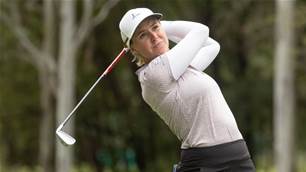If ever a sporting destiny beckoned, it was for Craig Williams to ride winners.
If ever a sporting destiny beckoned, it was for Craig Williams to ride winners.
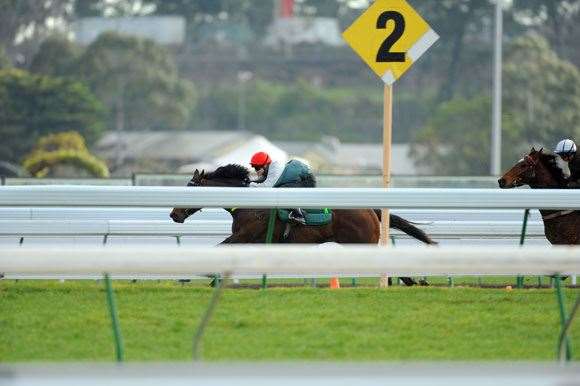 Melbourne Track. Images: Jeff Crow / Sport the Library
Melbourne Track. Images: Jeff Crow / Sport the LibraryWith father Allan a former leading jockey, and his grandfather, uncle and two brothers successful trainers, he was never going to be far from horses. But it wasn’t easy: Williams was 57kg at the age of 16. How he has maintained his racing weight, and found success riding champion horses all over the world, is an inspiring story of dedication and perseverance. Williams is now one of this country’s leading hoops: four times (and counting) winner of the Scobie Breasley medal (racing’s equivalent of the Brownlow), and Melbourne’s premier jockey for the last four years (and counting). He’s ridden winners in Cox Plates, Golden Slippers, VRC Oaks, Australian Cups, among numerous other Group One titles. His profession has taken him to Hong Kong and the UK for extended stints, but lately he’s been preparing for another massive tilt at Melbourne’s Spring Carnival. Here’s how.
SCALES OF JUSTICE
“The goal for a jockey is to be as light as he possibly can and as strong as he possibly can. Dieticians will tell you that there’s only
one other profession that’s equal to horse racing in this respect; it sounds a bit sissy, I guess, but they’re elite athletes – and that’s ballerina dancing. Boxing is in a different field – the same as rowing – because after you weigh in you can go and eat as much as you want. But whatever we weigh out, we must weigh back in after competing.”
ALONG FOR THE RIDE?
“To be a jockey, well, it’s just amazing how fit you have to be to ride a horse and compete at this level. It’s extreme fitness“I laugh: you can put someone on my mechanical horse – first of all they struggle to get their legs up into position, and then if they can sit there for 30 seconds they’re usually grimacing in pain. When they get off they can’t walk for the first 15 metres, and the next day they’ll report back that they’re sore where they didn’t even think they had muscles!
“When you compete nearly every day, every weekend, you take it for granted how fit you are. When you’re fit, all you’re doing is turning yourself over, turning yourself over … you can’t get any fitter, so you’ve just got to keep your body limber and stay mentally sharp. But you can quickly lose that fitness, so my work routine is always harder coming off a holiday or a break; that’s when I really program myself.
“One thing I always look at when I’m riding is that if I’m injured and sore and might cost a horse winning, I won’t ride. A lot of jockeys will be performing with pain and discomfort, like footballers – maybe some jockeys for the rest of their lives. And that’s the risk that you take. But I’ll never cost a horse or trainer or connections a win because of my lack of fitness.
“The secret to riding horses is an easy mathematic ratio: we weigh 50-58kg, and horses weigh 400-500kg, so it’s all about technique and working with the horse. It’s not about strength.“I ride five days a week – it used to be six but I’ve cut it back. On a normal day I get up at 4.30am. I stretch and build up my core flexibility with a few stomach crunches for half an hour. Then I’ll go jump on my mechanical horse for about two minutes, and then I’ll go to work.
“Some mornings you might do slow work, and that ends up working different muscles in your body compared to riding fast work or riding in the racing position. With slow work you just canter horses around; you’re actually riding with your stirrups longer and you use more of your shoulder muscles to slow the horse down by forcing your hands firmly on the reins on the horse’s neck. If I haven’t ridden slow track work for a month and then I do it, I’ll definitely be muscle sore in certain areas.”
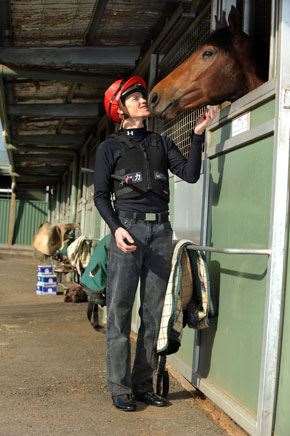 "you need willpower, but that’s never been a problem for me." Images: Jeff Crow / Sport the Library
"you need willpower, but that’s never been a problem for me." Images: Jeff Crow / Sport the LibraryOFF AND RACING
“I was 16 when I went in for an assessment for my jockey’s licence. I was 57kg at the time (the other candidates were barely 40kg). My Dad talked them into allowing me to do a three-month trial – that my dreams of being a jockey would be shattered if they didn’t at least give me a chance. They had a meeting, came back, and gave me three months. I would have to stay in school and if my weight came down and I still wanted to be a jockey at the end of that time, I could start my apprenticeship.
“There wasn’t the help available to me that apprentices have now through the racing industry – these days they have the best dieticians and nutritionists. When I started there wasn’t any kind of emphasis on that side of things, so a lot has changed. We had to find the experts ourselves.“My parents sought out a top nutritionist, so we were able to learn and understand food values. From then on we were really lucky. I got put on to a sports dietician, Karen Inge, who’s now at the Institute of Sport. It was amazing that our paths crossed, luckily for me so early in my career. She was brilliant.
“It’s not like I follow any kind of fad diet. Karen didn’t change my diet around so I could compete; she just recognised the fact that my body was growing. You need to be strong, so you just need to be aware of the food you’re eating and how your body reacts to it. Everyone’s different. By good cooking and good management, I never had a strict diet – I was always just given good options. That’s the reason why I’m where I am now, because in my life, as a juvenile, I wasn’t told what I had to eat, and I think that’s really helped me mentally.
“I also walked 8-10km every day – I had to do that or else I’d be too heavy. My body is so adapted now to walking – I could walk ten kilometres in an hour and 20 mins, so I could really hike. Running tired me out too much; I enjoyed power walking more than running and I found I had more energy on race day.
“Of course, I walked to make myself sweat: I wore plastic bags, five jackets, everything. I even had plastic Gladwrap gloves on. It wasn’t very comfortable but the other choice I had was to sit in a sauna and take diuretics, which at that time you were able to take. My father was a jockey, and all he knew [about weight management] was ‘don’t eat, take tablets and sit in a sauna’. But they wanted a better life for me, which is why they sought out those diet experts. So I don’t have to sit in the sauna and diuretics are barred, which is great.
“Back in those days jockeys thought that smoking would stop them putting anything else in their mouths. But my father was never a smoker – and told me not to smoke. And he kept me away from alcohol, which is a big help when you’re keeping an eye on your weight. I don’t drink at all.”
WEIGHT’S RIGHT
“These days I know some weeks in advance what weight I will have to ride. If it becomes my goal to ride at a very light weight, it’s obviously for a horse that’s worth it. And so I prepare for it. I don’t all of a sudden say that in three days I’m going to drop two kilos and compete, because I know I can’t do it – I know I can’t do it strong, so I’m no benefit to anyone. Everything is about preparation.
“When I have to ride light, my diet changes two weeks out. My diet consists mainly of vegetables, though I might have meat in the first few days. But from ten days down there would be no red meat, and it’ll be fish and vegetables. If I was happy with my weight coming down to a sensible level, where I was comfortable, I would continue with the vegetables and the fish. If I was struggling I would go to fish and salad, and then at the end it would come down to just salad and fruit. It just depends on where I am with
my body. But I’ve found it’s all about preparing properly. Nowadays I know what foods work best for me – I know what foods actually flush out my system.
“Of course you need willpower – but that’s never been a problem for me: I’ve always really wanted to be a jockey. I love it. You make sacrifices, but for where I am now, they seem like very minor sacrifices ... ”
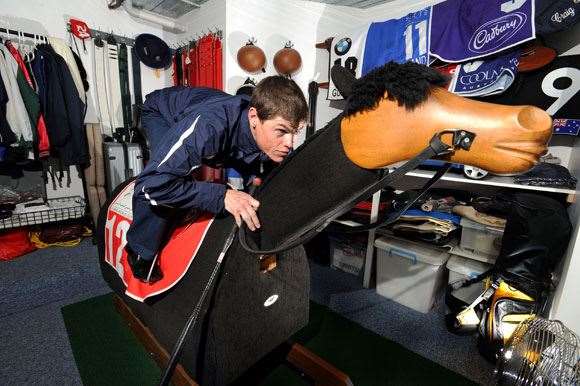 The mechanical horse is the ultimate pre-race tool. Images: Jeff Crow / Sport the Library
The mechanical horse is the ultimate pre-race tool. Images: Jeff Crow / Sport the LibraryCROSS TRAINING
“When you’re fit, you’re fit. After that, it’s about keeping my body flexible, keeping my core really strong – it’s most important that I feel comfortable getting down on top of my horses.
“I love cycling – I find it really good. Lance Armstrong is one of my role models. When I was in Hong Kong I would go the hills over there on my mountain bike – I’d love it. I brought it back from Hong Kong and still ride. And I love hiking – it’s one of my passions. Even when I go on holidays I love to be able to walk up mountains.”
PERFECT PREPARATION
“The day before the races I sit down on a computer and spend four to five hours studying my opposition for the next day. That’s pretty demanding mentally, so my wife tells me I have to have a sleep, and she’s the boss. The more I read up about the importance of sleep the more convinced I am. Through experience I’ve felt that
if you don’t sleep, your body gets worn out. Recovery is one of the most important parts of competing day in and day out.”
ROLFING
“During the Spring Carnival I fly a bloke out from Hong Kong – he does a form of massage called rolfing. Brilliant. I say it’s brilliant: it works for me. I’ve had a lot of injuries in the past and I’ve had cramps and I couldn’t feel my feet after riding sometimes. He had one look at me and he could tell me all about my body. From then on I’ve been a believer in rolfing.
“I also use a gentleman in Sydney who’s very good, and I’ve got a couple of others I go to in Melbourne, but I’ve just found that this gentleman in Hong Kong, Steve Bremner, he just knows my body really well. He started turning me inside out and I’ve found my body’s never more supple and strong at the same time.
“He’s actually Canadian. If I’m ever going through Hong Kong or competing, I always make sure we catch up, as well as some other time in the year. But he can tell me where I’m at with my body. Some people like acupuncture, some people like chiropractors. For me, it’s a question of confidence in a person. And he helps me out in the most important time of our year.
“Rolfing actually teaches your body to go in the right direction, to be central and centred. I don’t even really have to see him every week or every month. The time that I see him puts my body on the right path to when I see him next.”
SUPPLEMENTARY QUESTIONS
“I take Spirolina and I’m always conscious of colds and flus, so I always hit myself very hard with vitamin C if I feel something coming on. But basically I live on vegetables and fruit.“On race day I take a banana and Mars Bar and I take V and a sports drink, which is always Powerade. I start the day off with a banana and either water or Powerade. If I feel I need a pickup later, and depending on how long my races are, I’ll go for a Mars Bar and a V to make me alert. Out of all the drinks that give you a big kick, V is the only one that doesn’t dry me out. I find that very important for performing at the races.
“Once you weigh out you must come back in at the same weight. So your intake has to benefit your racing – a sandwich I find is completely pointless, but if it works for someone else, fine. I’ve never drunk Coke during the day, which works for Lleyton Hewitt. Everyone’s different.
“We’re allowed to rinse our mouths with water before a race, but I’ll never swallow. In extreme circumstances, when I have to ride a really light weight, I’ll bring watermelon and that will be my fluid supplement for the day.”
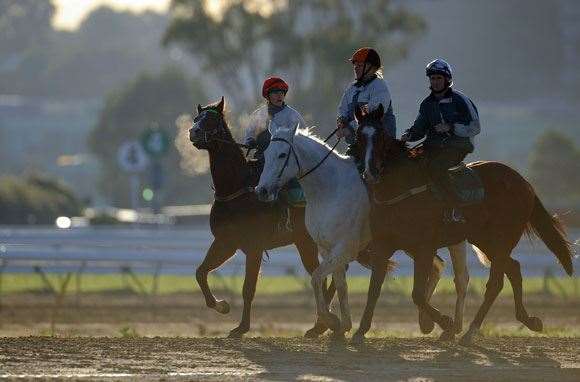 Trackwork means early starts for Williams ... but he loves it. Images: Jeff Crow / Sport the Library
Trackwork means early starts for Williams ... but he loves it. Images: Jeff Crow / Sport the LibraryPAIN
“Most jockeys ride with some kind of pain – either through general wear and tear or from a combination of falls and injuries. We’re actually very similar to the footballers – we have the same rules for drug testing, the same strict guidelines. We can take Nurophen, but we can’t take Nurophen Plus.
“It’s a choice you make. Jockeys are very tough and deserve the respect they get. The decline in numbers is evidence of how demanding and tough a sport it is. You’d be amazed how the number of jockeys has decreased in the last few years.
“I’ve got shrapnel. I’ve had a broken shoulder – it’s got a plate and seven screws in it. I’ve cracked both sides of my pelvis. Broke my leg. Got a screw in my left middle finger … But you know, at the end of it, I’ve been very lucky because I haven’t had any head or spinal injuries.”
– Graem Sims
Related Articles
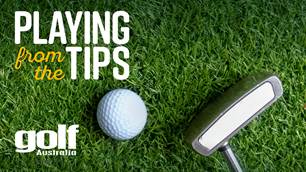
Playing From The Tips Ep.100: Webex Sydney, Honda LPGA, Mexico & Kenyan Opens
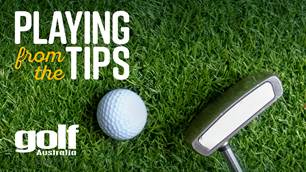
Playing From The Tips Ep.102: NZ PGA, Arnold Palmer, LIV Hong Kong, Blue Bay & cancelled WPGA
